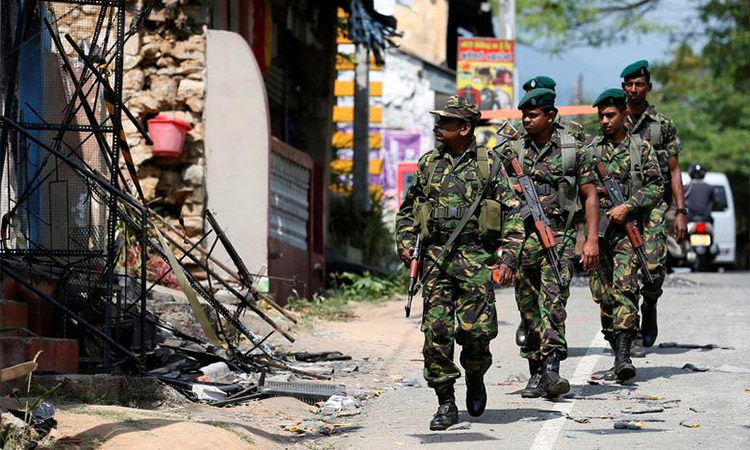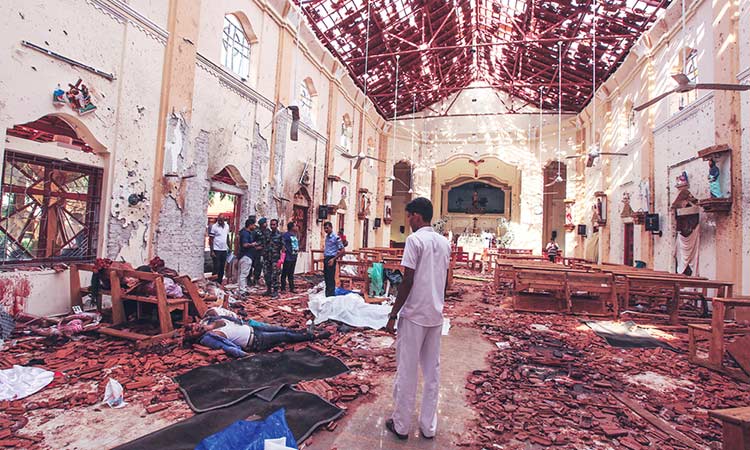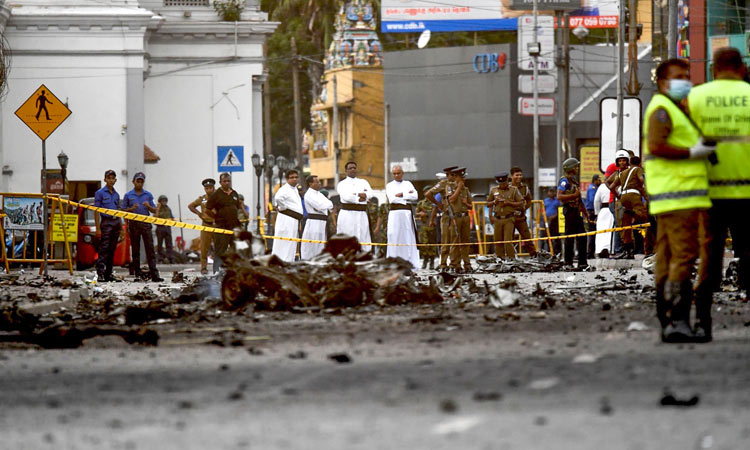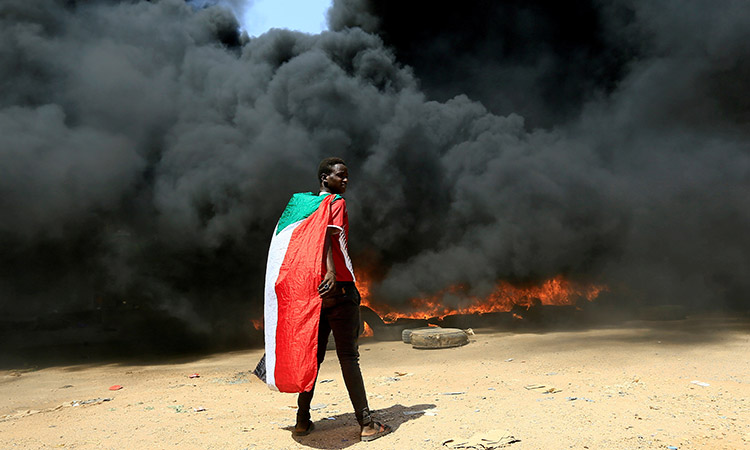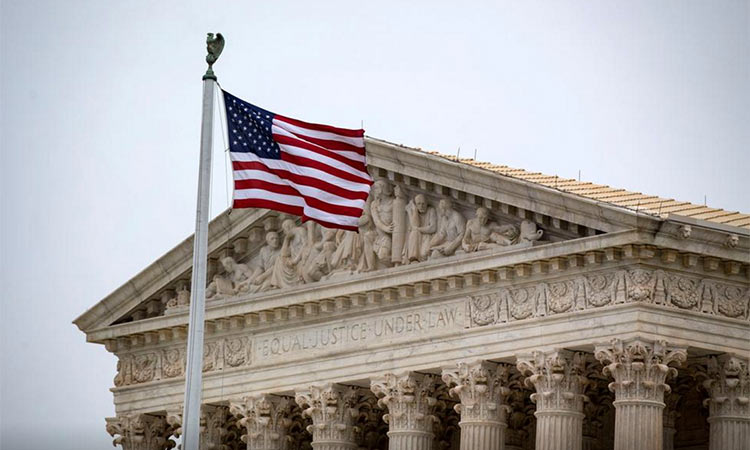Timely action could have saved lives
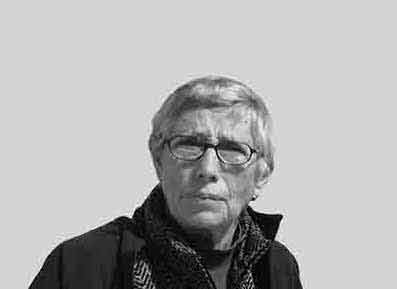
Michael Jansen
The author, a well-respected observer of Middle East affairs, has three books on the Arab-Israeli conflict.
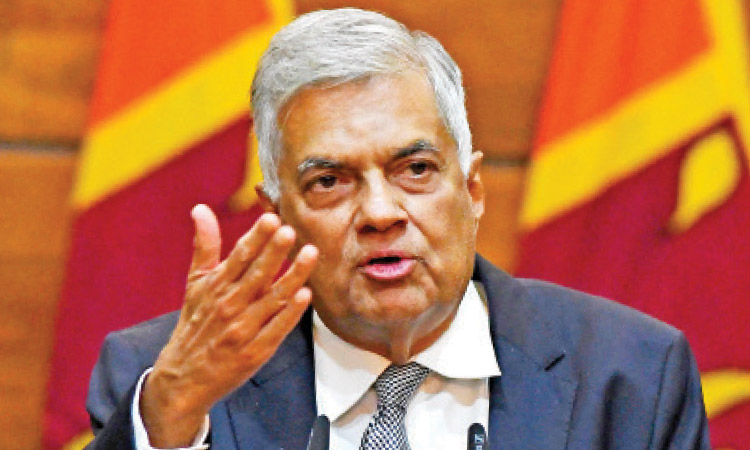
Ranil Wickremesinghe gestures as he answers questions from a journalist in Colombo. AFP
The Cypriot police have at long last apprehended the island’s first serial killer whose career may have begun in late 2016. If the police had detained him before April 14th of this year, the fate of several missing foreign women could have been solved and lives could have been saved. His killings may not have been limited to the seven he has admitted, he had been in contact with another 30 women.
SRI LANKA
On the day after the April 21st Easter massacre in Sri Lanka by radicals influenced by and perhaps affiliated to Daesh, Prime Minister Ranil Wikremesinghe said that a senior police officer passed on specific warnings from Indian intelligence that there could be attacks on Christians and the Indian embassy. This was not the only warning. In January 100 kilogrammes of explosives were found at a farm in western Sri Lanka. Wikremesinghe said, “The information was there (but) adequate precautions” were not adopted.
Why? Neither he nor President Maithripala Sirisena, who is in charge of the military and security agencies, say they were not told of the Indian communications repeated over the two weeks before the deadly explosions at three churches, three luxury hotels, a guest house and a flat where the pregnant wife of one of the bombers killed herself, her two children, and three policemen. In the aftermath of the Easter massacre, caches of explosives and a pipe bomb were discovered in Colombo and 15 people were killed in the east of the country when security men raided a safe house and arsenal.
The government is dysfunctional. The president and premier are involved in a bitter power struggle and are not forming a common policy. This is unforgivable.
So far the police chief and a senior Defence Ministry bureaucrat have been compelled to resign.
Sirisena responded to the massacre by imposing a state of emergency, the first since 2011, granting the country’s security apparatus wide powers of search and arrest and limiting press freedom. A social media ban and night-time curfew had already been enforced. These measures were too little, too late. Sri Lankan security should have acted in January or, at least, in early April when the first Indian warnings were passed on. Daesh has repeatedly proclaimed that the cult intends to position “sleeper cells” across the world and mount suicide bombings and other operations against Daesh’s enemies.
Moderate Muslims had been telling the authorities that a radical faction had emerged in the puritanical Muslim group, National Thowheed Jama’ath. The leader of this faction, Muhammad Zahran Hashim — who was killed at the Shangri-La hotel in Colombo — was self-radicalised. He went underground in 2017, fearing arrest. He was named as the leader of the extremist faction by Indian intelligence.
In 2016, the Justice Minister Wijeyadasa Rajapakshe told parliament that 32 Sri Lankan Muslims from educated families had joined Daesh but the prime minister said the men, who had returned to the country, could not be arrested since joining a foreign terrorist organisation is not against the law in Sri Lanka. This seems to be a major misjudgement for which both government and parliament are responsible.
CYPRUS
Greek Cypriot National Guard captain Nicos Metaxas was arrested two weeks ago only after the body of one victim, missing since last May, was found in an abandoned mine. The corpses of three, two Filipinas and a Nepalese, have been recovered. Police have searched two lakes near the mine where the first body was discovered by chance by a man on a walk and at a military firing range. Metaxas has admitted to killing four others, two women and two girls. The bodies of three victims were put in suitcases and thrown into a lake near the mine. A source in the Flipino community told Gulf Today there could be an eighth victim, a Vietnamese.
The lax attitude of the Cypriot police mirrored the approach of the Sri Lankan authorities. The women were reported missing soon after they disappeared but there were no serious investigations. The majority were Asian housemaids although one woman and her daughter were from Romania. Several came into contact with their killer on a dating website, clearly a very dangerous way to meet.
The owner of three cars, he also used to cruise neighbourhoods where Filipinas congregate, switching from one vehicle to another, in search of victims.
By failing to tackle cases as soon as the first disappearances were reported, the police have been blamed for enabling the killer to continue his brutal career. A committee dealing with family violence attached to the Justice Ministry said that between 1990-2019, 39 women, including four minor girls, have been reported missing but have not been found. The committee stated, “And even though the legal framework is there as is the protocol to investigate these cases, one wonders why these women are just a list.” The answer to this question is that the women were mainly Asian house- maids. When a Filipina housemaid goes missing, the head of the domestic workers’ association Nicos Koutroukides argued the police dismiss her disappearance by saying, “She’s gone to the (Turkish-occupied) north with her boyfriend.” Cyprus has been divided since 1974 when the Turkish army occupied the northern 36 per cent of the island following a coup mounted by the Greek junta.
It took Cyprus President Nicos Anastasiades until April 26th to address the murders and then he appealed for calm and urged the public not to apportion blame until the investigations are concluded. No one has been fired, yet.
Neither Sri Lankan nor Cypriot politicians have been courageous enough to adopt the slogan taken on by mid-20th century US President Harry Truman, “The buck stops here,” meaning “I am responsible.”
